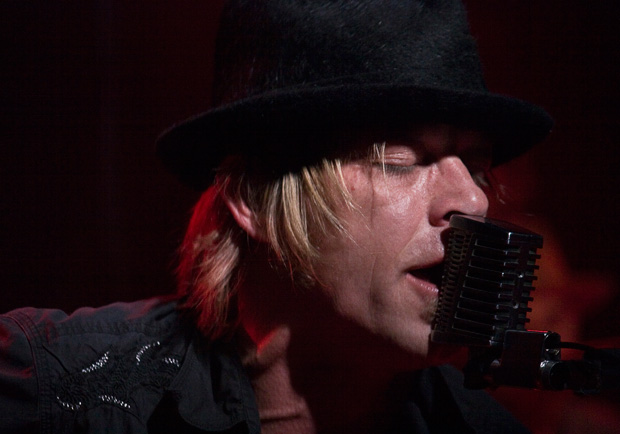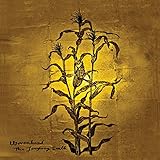For a long time, making it in secular markets as a Christian artist meant toning down the Jesus talk. On the assumption that a hefty percentage of the listening public would bolt at the faintest whiff of God-rock, record labels played down their Christian musicians' religious angle as much as possible, when they didn't resort to euphemisms like "positive" and "uplifting."
The Laughing Stalk
September 11, 2012
Wovenhand's David Eugene Edwards and his label, Sounds Familyre, do no such thing. Instead, over a decade of albums, including his latest, The Laughing Stalk, Edwards has written songs with boldly Christian messages. The language of his lyrics can be downright Puritan in its devotion: ""Hail, hail, hail the high king of heaven / Christ Jesus, ruler of all." And he plays for audiences who often wouldn't know John Bunyan from Paul Bunyan.
In 2010 the alt-metal band Tool, a group known for graphic content in its lyrics and album art, brought Wovenhand on tour as its opening act. On the more genteel end of the secular sonic spectrum, NPR invited Edwards to perform for the Tiny Desk Concert video series. So how is it that Edwards—in Wovenhand and also in his previous band, 16 Horsepower—is more at home with church outsiders than he is with those in CCM circles? What is it about his combination of lyrics and melody that appeals to music fans who don't share his worldview? How does he get away with it when so many others don't?
It comes down to consistently high standards of artistry. Edwards uses minor keys, theatrical vocals and a prominently featured, nylon-stringed mandolin/banjo hybrid from the 1880s to create a distinctive, instantly recognizable sound. The mood is often dark, even menacing at times, which is one reason Wovenhand appeals to fans of Tool and other heavy acts. You'll hear the influence of musicians like Nick Cave and Jim Morrison, but the sound isn't derivative. "New" doesn't necessarily equate to "good," but Wovenhand pulls it off. Edwards fits in right alongside fellow trailblazers and Sounds Familyre label mates Sufjan Stevens and Danielson.
Wovenhand's brooding vibe and penchant for King James terminology (locutions like "hath," "thou," and "thy" abound) give the music an otherworldly feel—like hearing songs unearthed from a forgotten civilization where the mando-banjo once reigned. It's strikingly different from most music labeled "Christian rock," and that stylistic contrast has the effect of prying open the minds of listeners who would otherwise never be caught dead listening to "Christian bands." This leap outside the box takes creative ambition and more than a little risk on the part of the songwriter. Daniel Smith probably got some funny looks when he first began singing in that pinched, nasal falsetto with Danielson Famile, and bluegrass purists likely scoffed at how Sufjan Stevens played his banjo on Seven Swans.
Lyrical fearlessness
Clearing that initial genre hurdle allows an artist like Edwards to be lyrically bold. Throughout his career, Edwards has emphasized Christ's Incarnation, humiliation, kingly majesty and perfect obedience, as well as God the Father's omniscience and omnipotence (and, in contrast, man's place under God). Reviews in non-religious publications tend to argue that even though Edwards sings about Jesus, he doesn't proselytize. (The same was often said of Stevens in his early days, seemingly as a way of explaining why it was OK to write about his music.) That's true to a certain extent. His primary intent as a songwriter and performer may not be to convert others. But much of Wovenhand's music exalts God as the One and Jesus as the Savior. Edwards doesn't just sing with a preacher's fervor. He preaches.
On a song called "Straw Foot" that he wrote while still in 16 Horsepower, Edwards sang, "See the high priest, he took my place / When the judge looks at me he sees his son's face." On Wovenhand's debut (Woven Hand) he sang about God's "perfect will" and the compassion and love that come "from the Father above." Edwards gets specific, too, ripping verses from the Bible verbatim. On the heavy yet propulsive track "As Wool" from The Laughing Stalk, Edwards not only quotes Daniel's "Ancient of Days" vision from the Old Testament ("The hair of his head whiter than wool / His throne it was aflame with fire"), but also weaves it into the tale of Ahab and Elijah from 1 Kings. But perhaps Wovenhand's most brazen lyrical turn comes from "Chest of Drawers" on the 2004 album Consider the Birds: "The world will bow / The knees will be broken for those who don't know how."
While it may seem counterintuitive, this boldness is a crucial aspect of Wovenhand's ability to reach across the religious divide. Lyrical fearlessness elicits respect, even when the topic is unpopular in certain cultural mediums or genres. Edwards's passion is evident. It's fiery. It's heartfelt. It's authentic. (Or, to avoid an argument on what authenticity means, it sure feels authentic.) And it's far better than bands that hedge their bets by including one "Christian" track on an album of otherwise spiritually anonymous material.
Wovenhand isn't a crossover act in the usual sense of the term. Edwards is no Amy Grant. He'll likely never have a hit on commercial radio. But one fortunate result of the increasingly niche-driven music industry is that bands need not rely solely on radio to develop a fan base. With a dedicated following, artists can sell thousands of records with little or no radio play. That's good news for bands like Wovenhand, since minor-key songs about the Old Testament aren't exactly Clear Channel fodder. The more Christian artists who cross over in this nontraditional way—with artistic integrity and uncompromising lyrical convictions intact—the more it will embolden others to find their niches and do the same.
Joel Oliphint is a freelance writer in Columbus, Ohio. He is on Twitter at @joeloliphint.










